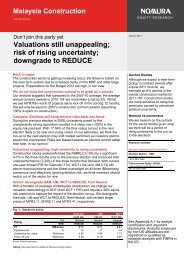Download PDF - ETP - Pemandu
Download PDF - ETP - Pemandu
Download PDF - ETP - Pemandu
You also want an ePaper? Increase the reach of your titles
YUMPU automatically turns print PDFs into web optimized ePapers that Google loves.
<strong>ETP</strong> ANNUAL REPORT 2011<br />
Exhibit 7.3<br />
Developing Integrated Circuit Design Firms<br />
Integrated Circuit (IC) design companies are ideal test beds to<br />
produce highly-skilled human capital as they require knowledge<br />
workers with the inventiveness to create intellectual property.<br />
Malaysia has only achieved moderate success in this field, with a<br />
mere 15 active IC design firms comprising a blend of multinational<br />
and domestic companies before 2011. Nevertheless, the success<br />
of existing IC design facilities like Intel’s Penang Design Centre has<br />
set the stage for others to follow in their footsteps.<br />
The goal of this EPP is to add another 50 IC design companies<br />
beyond the present number. Batu Kawan in Penang has been<br />
designated as a hub for high value E&E including IC design<br />
services.<br />
Achievements<br />
Five out of the original 2011 target of 10 IC design firms have<br />
been set up. Additionally, an IC Design Centre of Excellence has<br />
been completed on schedule while the Failure Analysis Lab is<br />
estimated at 65 per cent completion. However, the 2011 target<br />
for a Contactless Testing Lab, eg. Penang Skills Development<br />
Centre’s (PSDC) EMC lab, to achieve international accreditation<br />
was only obtained in early January 2012. Additional resources will<br />
be invested to assist PSDC to increase the reach and effectiveness<br />
of the EMC Lab, which was funded by an initial Economic Planning<br />
Unit (EPU) grant. This service offered by this lab will further<br />
strengthen efforts to grow the high value-added design and<br />
development cluster.<br />
Centre of Excellence (CoE)<br />
for Electrical and Electronics: IC Design<br />
The CoE is an educational institution whose main point of focus is in<br />
Integrated Circuit (IC) Design. It provides education through short<br />
courses with the objective of aligning the E&E industry in a<br />
competitive and innovative track, in line with EPP3: Development of<br />
IC Design Firms. Usains InfoTech Sdn Bhd (UISB) acts as the Special<br />
Purpose Vehicle for this project.<br />
26 graduate trainees<br />
in Advanced Digital<br />
Design<br />
24 graduate trainees<br />
in Advanced Analog<br />
Design<br />
• Commenced on Jan 2010<br />
• Completed in June 2011<br />
• Commenced on Aug 2010<br />
• Completing in Jan 2012<br />
Development programmes<br />
• Product development for potential spin-off and nurture local incubator<br />
• Development of IC Design Outsourcing Programme to support ecosystem<br />
• Promote CoE E&E initiatives<br />
126<br />
EPP 3<br />
MSc degree<br />
by USM<br />
Exhibit 7.4<br />
Failure Analysis Illustration<br />
Level 1<br />
Physical<br />
Analysis<br />
Gross Defect<br />
• Physical<br />
• On surface<br />
Level 2<br />
Electrical Physical<br />
Analysis<br />
Embedded Defect<br />
• In between layers<br />
• Embedded<br />
defects<br />
Level 3<br />
Material<br />
Analysis<br />
Material<br />
characterisation<br />
• Molecular defects<br />
• Polymer bonds<br />
and structures<br />
Moving Forward<br />
A concerted effort will be made in 2012 to address the shortfall<br />
in meeting this year’s KPI targets. Specifically, the lead (MIDA)<br />
and supporting agencies (NCIA, EPU, MDeC, Silterra and the<br />
fabrication consortium) for this EPP will intensify the drive to<br />
attract multinational corporations and grow local players at the<br />
originally-proposed rate of 10 per year for a total of 50 by 2015.<br />
The agencies will continue to identify and encourage potential IC<br />
design companies to set up in Malaysia with the value proposition<br />
of proximity to fabrication facilities. MIDA will seek to entice<br />
potential firms with pre-approved incentives with particular<br />
focus on filling the niche for smaller design firms. Such incentives<br />
seek to encourage multinationals to outsource their IC design to<br />
domestic firms. Meanwhile, the EPU will increase financial support<br />
to skills development centres to develop human capital in IC<br />
design. To support the emergence of aspiring local companies,<br />
NCIA is putting in place several measures to lower the start-up<br />
costs for home-grown firms. These include the provision of a<br />
prototyping lab, a test lab for certification and standards, and the<br />
requisite electronic design automation tools on a sharing and<br />
pay-per-use basis.








